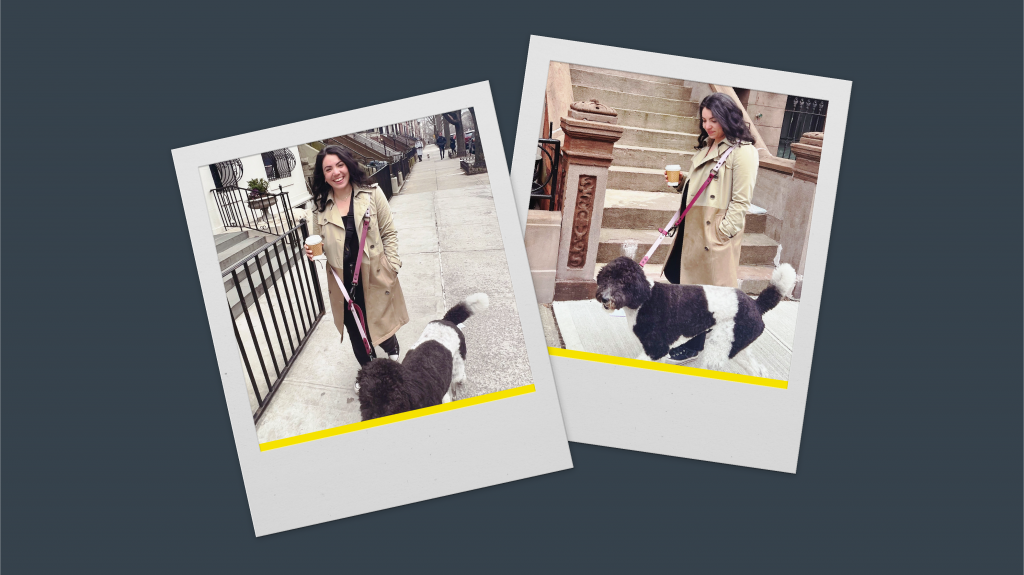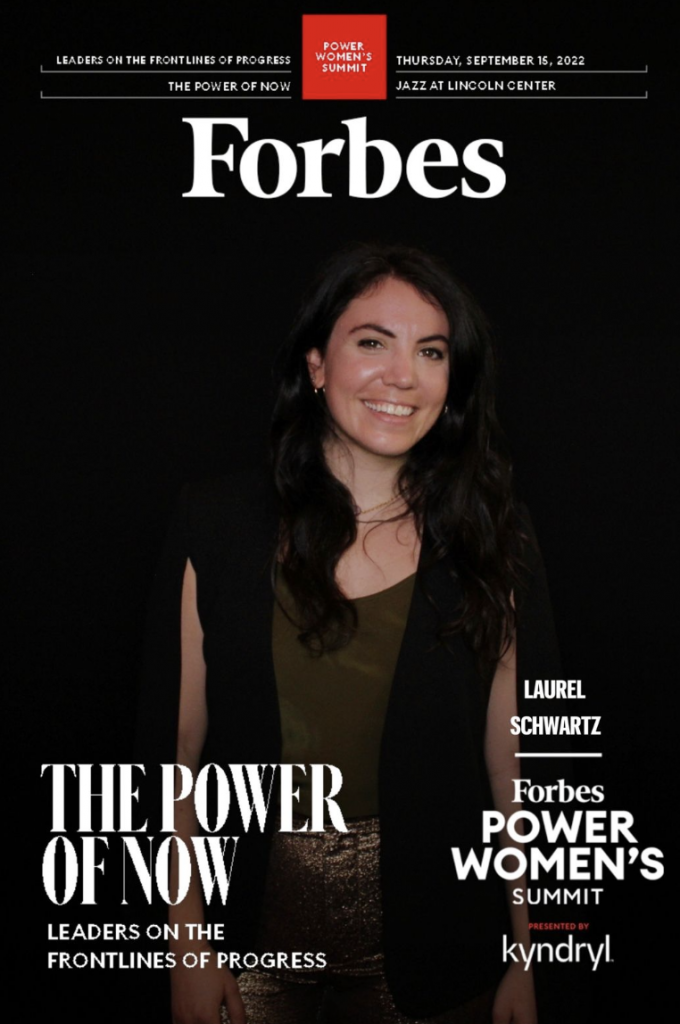What We’re Up To

We grabbed coffee with our Digital Account Director, Laurel Schwartz to chat about her perspective as a social worker, marketer and documentary filmmaker and how she landed a spot on the Forbes 30 Under 30 list.
How do you like your coffee?
Immediately when I get up in the morning in order to function.
But, if we’re being specific, I love a light roast in my french press with a splash of almond milk at home. Or I grab an oat milk cappuccino if I’m out and about. A morning coffee walk with my pup and a podcast is a mental health non-negotiable for me.
Last year, you were named on the Forbes 30 Under 30 List. Tell us a little bit about that!
I was! It’s one of those things that still doesn’t quite feel real to me. I knew I had been nominated, but I didn’t in a million years ever think I’d actually be on the list. There’s no communication about the final results ahead of time, so I actually found out by reading the list when it came out just like everyone else!
While I was included for my entire career, I specifically landed on the list that year for my work as the Brand Director at Crisis Text Line. At Crisis Text Line, I helped build the marketing program and launched a campaign that connected thousands of frontline workers with free mental health services at the height of the COVID pandemic. Leading a crisis-response brand to help people find the support they need through a globally historic event that caused trauma for so many was certainly hard, but I truly felt like I was doing the work I was meant to do. It was the role of a lifetime.
As part of the Forbes community, I have the opportunity to connect with so many innovators and leaders across a variety of industries. I’m looking forward to building community with more of the Under 30 and Over 50 listers again next week when I join them for their International Women’s Day Forbes 30/50 Conference.

Sounds fun! What is the Forbes 30/50 Summit?
The Forbes 30/50 Summit is an annual event that brings together a diverse group of influential leaders and entrepreneurs from various industries. The summit is designed to create a platform for established and emerging leaders to connect, share their experiences, and gain valuable insights into the future of business and entrepreneurship.
The event provides an opportunity for attendees to come together to engage in conversations about the latest trends and innovations in their respective industries, explore potential collaborations, and gain valuable insights into the future of business and why it’s key for brands to invest in cultural competency.
I’m super honored to be included in the Forbes community and have the opportunity to attend.
You’ve worn a lot of hats in your career—producing commercials, case managing as a social worker, leading a crisis-response brand—what made you keep coming back to marketing and communications?
I ended up in marketing and communications a bit by accident. I was diagnosed with a chronic autoimmune disorder when I was really young — 10 years old. YouTube launched soon after I got sick, and suddenly people were creating content and connecting all across the world about anything and everything. So I spent my free time cobbling together videos about my life and advocating for others with chronic illnesses in Windows Movie Maker and posting them online. Pretty quickly, people I’d never met before started responding in YouTube comments and sharing their own experiences with chronic illness.
It wasn’t until the last few years that I really started to make sense of my whole path. I realized that time as a kid making content that built community and helped people feel seen is what I’ve been doing my entire life. I feel really lucky to have built a career out of it.
How do you think having those foundational experiences so young influenced the rest of your path?
I started working at an advertising agency right out of college where I had exposure to a wide variety of clients as a producer (I’ll keep the story about filming a commercial from the top of the highest rollercoaster in America for another day). At that agency, I worked on projects ranging from broadcast spots for Fortune 500 brands to social content for nonprofits. It wasn’t until I actually took a break from advertising and made a bit of a pivot to a different field that I started to make sense of how my marketing and communications skills could help build community at scale.
In 2017, I moved to New York City to attend Columbia University and get my Master’s in Social Work (a curveball, I know!). At Columbia I did a deep dive into human behavior: what makes people tick? Why? And, how do social systems influence the ways people behave?
At the same time, I also ended up on the film festival circuit for a self-produced documentary about my life with chronic illness while in graduate school. I won All-Around Best Picture at the ReelAbilities Film Festival which led to the opportunity to screen the film at places like Vimeo HQ, NBC Universal and CitiBank as part of their Diversity, Equity and Inclusion programming. At these screenings, I started to see the things I was learning in social work school play out right in front of me. Sharing my story gave people permission to show up in ways they never felt they could before.
All of this is to say, in social work school, I started to see social work and marketing as one and the same. There, I developed a theory of change that I come back to often: powerful stories in strategic places can transform human behavior.
What have been the highlights of your work at BerlinRosen so far?
I’m so fortunate to support the powerhouse team building the Cultural Competency practice to help brands ranging from consumer products to advocacy organizations reach more diverse audiences authentically. As a practice, we’re enhancing brand perceptions, cultivating a more satisfied staff, grappling with crises or taking proactive and transformative action toward greater equity and impact.
We help connect organizations with the right people, knowledge, language and strategies to put their values into practice. And, we believe inclusive engagement is not just a one-off box to check; it’s a practice, a process and a strategy to deepen authentic connections while building a more competitive brand.
The team leading this practice is so smart, thoughtful and strategic. It is a thrill to learn from them every day.
Why did you join BerlinRosen?
This is actually my second time working at BerlinRosen! I spent a summer with BerlinRosen as an intern when I was in graduate school and loved the team and the work. When I was feeling ready for my next challenge, I knew that BerlinRosen was where I wanted to return. I feel so grateful to be able to work on a team dedicated to helping clients who are on the frontlines of progressive social change.
⚡️ Fast Facts
Last TV show I binge-watched:
Succession
Restaurant (delivery) I’d recommend to close friends:
I’m a known ice cream aficionado who accidentally moved down the street from Brooklyn’s best ice cream spot. If you’re in Brooklyn, definitely go to The Social and get “Ooeyer & Gooeyer.” It’ll change your life.
A concert that you loved:
Lady Gaga Chromatica Ball. She is a visionary in every way.
Best album ever:
I have a lot of favorites. I just did a Highway 1 road trip in California and had Beyoncé’s Renaissance on repeat, so that has a special place on my list for now.
My dream dinner guest is:
Can I say Lady Gaga again? Ha! See above re: visionary.
Book that changed me:
I read “The Alchemist” pretty much every January as a way to reset and put out good energy for the year.
Movie I’d pay to see again and again:
Frances Ha. Sometimes I play David Bowie’s “Modern Love” when I’m wandering around New York City just to think about the famous scene where Great Gerwig dances through the streets of Soho.
Advice I’d tell my younger self:
Keep following the things that are interesting to you–one day you’ll figure out how to make them all come together.